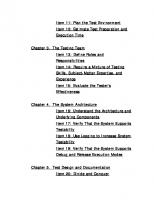Effective C++: 55 Specific Ways to Improve Your Programs and Designs, Third Edition [3rd edition] 0321334876, 9780321334879
The Barnes & Noble Review Since early in the 90s, working C++ programmers have relied on Scott Meyers sEffective C++
388 64 987KB
English Pages 320 [318] Year 2005
Table of contents :
Cover......Page 1
Contents......Page 12
Preface......Page 16
Acknowledgments......Page 18
Introduction......Page 22
Item 1: View C++ as a federation of languages.......Page 32
Item 2: Prefer consts, enum s, and inlines to #defines.......Page 34
Item 3: Use const whenever possible.......Page 38
Item 4: Make sure that objects are initialized before they’re used.......Page 47
Item 5: Know what functions C++ silently writes and calls.......Page 55
Item 6: Explicitly disallow the use of compiler-generated functions you do not want.......Page 58
Item 7: Declare destructors virtual in polymorphic base classes.......Page 61
Item 8: Prevent exceptions from leaving destructors.......Page 65
Item 9: Never call virtual functions during construction or destruction.......Page 69
Item 10: Have assignment operators return a reference to *this.......Page 73
Item 11: Handle assignment to self in operator=.......Page 74
Item 12: Copy all parts of an object.......Page 78
Item 13: Use objects to manage resources.......Page 82
Item 14: Think carefully about copying behavior in resource-managing classes.......Page 87
Item 15: Provide access to raw resources in resource-managing classes.......Page 90
Item 16: Use the same form in corresponding uses of new and delete.......Page 94
Item 17: Store newed objects in smart pointers in standalone statements.......Page 96
Item 18: Make interfaces easy to use correctly and hard to use incorrectly.......Page 99
Item 19: Treat class design as type design.......Page 105
Item 20: Prefer pass-by-reference-to-const to pass-by-value.......Page 107
Item 21: Don’t try to return a reference when you must return an object.......Page 111
Item 22: Declare data members private.......Page 115
Item 23: Prefer non-member non-friend functions to member functions.......Page 119
Item 24: Declare non-member functions when type conversions should apply to all parameters.......Page 123
Item 25: Consider support for a non-throwing swap.......Page 127
Item 26: Postpone variable definitions as long as possible.......Page 134
Item 27: Minimize casting.......Page 137
Item 28: Avoid returning “handles” to object internals.......Page 144
Item 29: Strive for exception-safe code.......Page 148
Item 30: Understand the ins and outs of inlining.......Page 155
Item 31: Minimize compilation dependencies between files.......Page 161
Chapter 6: Inheritance and Object-Oriented Design......Page 170
Item 32: Make sure public inheritance models “is-a.”......Page 171
Item 33: Avoid hiding inherited names.......Page 177
Item 34: Differentiate between inheritance of interface and inheritance of implementation.......Page 182
Item 35: Consider alternatives to virtual functions.......Page 190
Item 36: Never redefine an inherited non-virtual function.......Page 199
Item 37: Never redefine a function’s inherited default parameter value.......Page 201
Item 38: Model “has-a” or “is-implemented-in-terms-of” through composition.......Page 205
Item 39: Use private inheritance judiciously.......Page 208
Item 40: Use multiple inheritance judiciously.......Page 213
Item 41: Understand implicit interfaces and compile-time polymorphism.......Page 220
Item 42: Understand the two meanings of typename.......Page 224
Item 43: Know how to access names in templatized base classes.......Page 228
Item 44: Factor parameter-independent code out of templates.......Page 233
Item 45: Use member function templates to accept “all compatible types.”......Page 239
Item 46: Define non-member functions inside templates when type conversions are desired.......Page 243
Item 47: Use traits classes for information about types.......Page 247
Item 48: Be aware of template metaprogramming.......Page 254
Chapter 8: Customizing new and delete......Page 260
Item 49: Understand the behavior of the new-handler.......Page 261
Item 50: Understand when it makes sense to replace new and delete.......Page 268
Item 51: Adhere to convention when writing new and delete.......Page 273
Item 52: Write placement delete if you write placement new.......Page 277
Item 53: Pay attention to compiler warnings.......Page 283
Item 54: Familiarize yourself with the standard library, including TR1.......Page 284
Item 55: Familiarize yourself with Boost.......Page 290
Appendix A: Beyond Effective C++......Page 294
Appendix B: Item Mappings Between Second and Third Editions......Page 298
B......Page 301
C......Page 302
D......Page 304
E......Page 305
F......Page 308
I......Page 309
J......Page 310
M......Page 311
O......Page 312
P......Page 313
R......Page 314
S......Page 315
T......Page 316
V......Page 317
Z......Page 318
Cover......Page 1
Contents......Page 12
Preface......Page 16
Acknowledgments......Page 18
Introduction......Page 22
Item 1: View C++ as a federation of languages.......Page 32
Item 2: Prefer consts, enum s, and inlines to #defines.......Page 34
Item 3: Use const whenever possible.......Page 38
Item 4: Make sure that objects are initialized before they’re used.......Page 47
Item 5: Know what functions C++ silently writes and calls.......Page 55
Item 6: Explicitly disallow the use of compiler-generated functions you do not want.......Page 58
Item 7: Declare destructors virtual in polymorphic base classes.......Page 61
Item 8: Prevent exceptions from leaving destructors.......Page 65
Item 9: Never call virtual functions during construction or destruction.......Page 69
Item 10: Have assignment operators return a reference to *this.......Page 73
Item 11: Handle assignment to self in operator=.......Page 74
Item 12: Copy all parts of an object.......Page 78
Item 13: Use objects to manage resources.......Page 82
Item 14: Think carefully about copying behavior in resource-managing classes.......Page 87
Item 15: Provide access to raw resources in resource-managing classes.......Page 90
Item 16: Use the same form in corresponding uses of new and delete.......Page 94
Item 17: Store newed objects in smart pointers in standalone statements.......Page 96
Item 18: Make interfaces easy to use correctly and hard to use incorrectly.......Page 99
Item 19: Treat class design as type design.......Page 105
Item 20: Prefer pass-by-reference-to-const to pass-by-value.......Page 107
Item 21: Don’t try to return a reference when you must return an object.......Page 111
Item 22: Declare data members private.......Page 115
Item 23: Prefer non-member non-friend functions to member functions.......Page 119
Item 24: Declare non-member functions when type conversions should apply to all parameters.......Page 123
Item 25: Consider support for a non-throwing swap.......Page 127
Item 26: Postpone variable definitions as long as possible.......Page 134
Item 27: Minimize casting.......Page 137
Item 28: Avoid returning “handles” to object internals.......Page 144
Item 29: Strive for exception-safe code.......Page 148
Item 30: Understand the ins and outs of inlining.......Page 155
Item 31: Minimize compilation dependencies between files.......Page 161
Chapter 6: Inheritance and Object-Oriented Design......Page 170
Item 32: Make sure public inheritance models “is-a.”......Page 171
Item 33: Avoid hiding inherited names.......Page 177
Item 34: Differentiate between inheritance of interface and inheritance of implementation.......Page 182
Item 35: Consider alternatives to virtual functions.......Page 190
Item 36: Never redefine an inherited non-virtual function.......Page 199
Item 37: Never redefine a function’s inherited default parameter value.......Page 201
Item 38: Model “has-a” or “is-implemented-in-terms-of” through composition.......Page 205
Item 39: Use private inheritance judiciously.......Page 208
Item 40: Use multiple inheritance judiciously.......Page 213
Item 41: Understand implicit interfaces and compile-time polymorphism.......Page 220
Item 42: Understand the two meanings of typename.......Page 224
Item 43: Know how to access names in templatized base classes.......Page 228
Item 44: Factor parameter-independent code out of templates.......Page 233
Item 45: Use member function templates to accept “all compatible types.”......Page 239
Item 46: Define non-member functions inside templates when type conversions are desired.......Page 243
Item 47: Use traits classes for information about types.......Page 247
Item 48: Be aware of template metaprogramming.......Page 254
Chapter 8: Customizing new and delete......Page 260
Item 49: Understand the behavior of the new-handler.......Page 261
Item 50: Understand when it makes sense to replace new and delete.......Page 268
Item 51: Adhere to convention when writing new and delete.......Page 273
Item 52: Write placement delete if you write placement new.......Page 277
Item 53: Pay attention to compiler warnings.......Page 283
Item 54: Familiarize yourself with the standard library, including TR1.......Page 284
Item 55: Familiarize yourself with Boost.......Page 290
Appendix A: Beyond Effective C++......Page 294
Appendix B: Item Mappings Between Second and Third Editions......Page 298
B......Page 301
C......Page 302
D......Page 304
E......Page 305
F......Page 308
I......Page 309
J......Page 310
M......Page 311
O......Page 312
P......Page 313
R......Page 314
S......Page 315
T......Page 316
V......Page 317
Z......Page 318
![Effective C++: 55 Specific Ways to Improve Your Programs and Designs, Third Edition [3rd edition]
0321334876, 9780321334879](https://ebin.pub/img/200x200/effective-c-55-specific-ways-to-improve-your-programs-and-designs-third-edition-3rd-edition-0321334876-9780321334879.jpg)
![Effective C++: 55 Specific Ways to Improve Your Programs and Designs, Third Edition [3rd edition]
0321334876, 9780321515827, 032151582X, 9780321334879](https://ebin.pub/img/200x200/effective-c-55-specific-ways-to-improve-your-programs-and-designs-third-edition-3rd-edition-0321334876-9780321515827-032151582x-9780321334879.jpg)
![Effective C++ Third Edition 55 Specific Ways to Improve Your Programs and Designs [3 ed.]
9780321334879, 0321334876](https://ebin.pub/img/200x200/effective-c-third-edition-55-specific-ways-to-improve-your-programs-and-designs-3nbsped-9780321334879-0321334876.jpg)

![Effective C#: 50 specific ways to improve your C# [1 ed.]](https://ebin.pub/img/200x200/effective-c-50-specific-ways-to-improve-your-c-1nbsped.jpg)
![Effective C# (Covers C# 4.0): 50 Specific Ways to Improve Your C# [2nd ed]
9780321658708, 0321658701, 9780321659095, 0321659090, 9780321659149, 0321659147](https://ebin.pub/img/200x200/effective-c-covers-c-40-50-specific-ways-to-improve-your-c-2nd-ed-9780321658708-0321658701-9780321659095-0321659090-9780321659149-0321659147.jpg)
![Effective STL: 50 Specific Ways to Improve Your Use of the Standard Template Library [1st edition]
0201749629, 9780201749625](https://ebin.pub/img/200x200/effective-stl-50-specific-ways-to-improve-your-use-of-the-standard-template-library-1st-edition-0201749629-9780201749625.jpg)

![C++ Eficaz 55 maneiras de aprimorar seus programas e projetos [Terceira Edição]
9788577808205, 0321334876, 9780321334879](https://ebin.pub/img/200x200/c-eficaz-55-maneiras-de-aprimorar-seus-programas-e-projetos-terceira-ediao-9788577808205-0321334876-9780321334879.jpg)

![Effective software testing: 50 specific ways to improve your testing [5th printing ed.]
0201794292, 9780201794298](https://ebin.pub/img/200x200/effective-software-testing-50-specific-ways-to-improve-your-testing-5th-printingnbsped-0201794292-9780201794298.jpg)